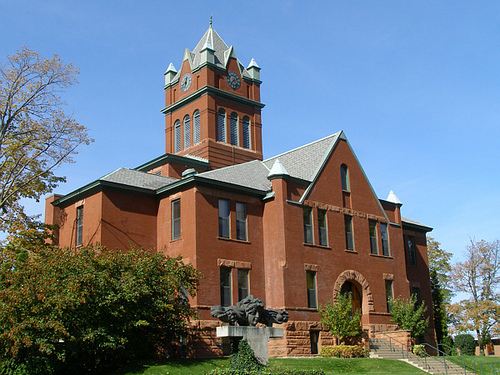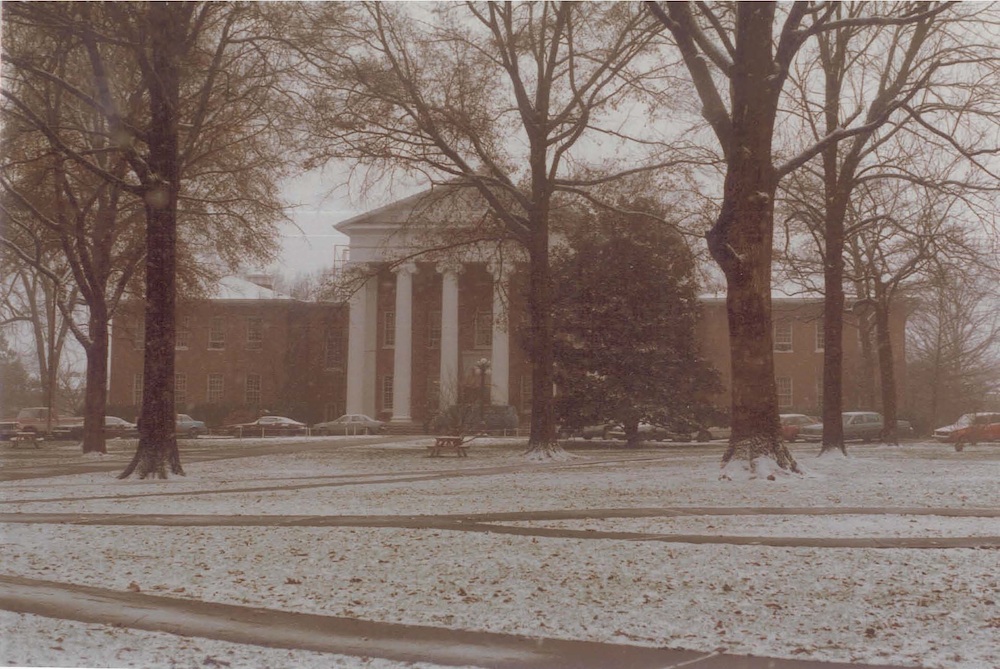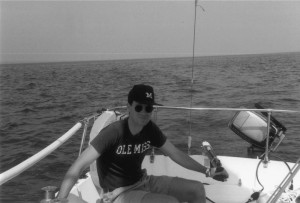By Tom Grier (M.A.,’87)
 Will Norton, Jere Hoar and Jim Pratt. When asked some time ago to put together a few recollections of my time as an MA Journalism student in the mid 1980s, and how the Ole Miss experience influenced my life and career, my memories of these three men first came to mind.
Will Norton, Jere Hoar and Jim Pratt. When asked some time ago to put together a few recollections of my time as an MA Journalism student in the mid 1980s, and how the Ole Miss experience influenced my life and career, my memories of these three men first came to mind.
They helped fashion writing skills that have been of pivotal importance in a brief career in journalism and public relations, and a longer career in law. Perhaps more importantly, they instilled values that emphasized effort, character and perseverance. And I also knew that these men cared about me as a person, as well as a student.
The full year I spent at Ole Miss from August 1983 to August 1984 as an M.A. candidate was one of the busiest of my life. I had an assistantship, a heavy class load and duties as a staff writer and senior staff writer for The Daily Mississippian.
I was far from my home in the upper Midwest. There were times when I felt overwhelmed, but the sense that these men cared and stood close, as well as the Ole Miss journalism community in general, gave me the strength to carry on. And I did not want to disappoint them.
I grew up in the Detroit, Michigan suburbs. After graduating from the University of Michigan with a B.A. in European History, I took the GRE with an interest in pursuing a graduate degree in journalism. My primary goal was to learn to write with discipline. I had worked for my high school newspaper as a co-editor and had written plenty of college papers, but my writing skills had not been honed.
The GRE process allowed me to send my scores to several journalism graduate schools at one time, and I chose Ole Miss as one of the schools. What intrigued me about Ole Miss was an article by the then writer-in-residence Willie Morris about Mississippi and Ole Miss. Willie Morris described Mississippi’s character and why it inspired writers like William Faulkner and others. Willie Morris also compared Mississippi to Ireland where I had recently spent the first semester of my undergraduate senior year at the University College of Dublin, with time spent in England and Scotland, as well.
In the spring of 1983, I was living at my parents’ home and received a call from Jere Hoar’s secretary, who indicated that “Dr. Jere Hoar from the University of Mississippi” was on the line, and wanted to speak with me. On that call, Jere Hoar said he had received my GRE scores and offered me one of the remaining MA journalism assistantships available for the 1983-1984 year, beginning in August 1983.
I accepted, but then flew down to Oxford in June 1983 to look over the campus. Driving down from the Memphis airport toward Oxford, the heat and humidity were powerful — akin to “warm glue” as described by William Faulkner, I believe.
Nonetheless, upon entering Oxford and Ole Miss, my first impression was a good one. The Georgian colonial red brick, and Greek-revival character of the campus buildings, the towering oak or elm trees in the Grove and Circle, and the rolling piney hills outside Oxford, were a stark contrast to the Berlin–like character of Ann Arbor, Michigan, where I had spent most of the last four years.
I met Jere Hoar at Farley Hall where he spoke about the nature of the South (to a northerner like me), writing, and potential topics for a master’s thesis. At that point, Ole Miss already felt special, a place where the craft of writing meant something, and where people, relationships and history mattered.
Two months later I drove through the lower Midwest to Ole Miss, staying with my sister in the St. Louis suburbs, before continuing on through southern Missouri, Arkansas and into Tennessee before reaching Mississippi. I had a room at Guess Hall, the graduate dorm. At the end of my first day on campus, I met some undergraduates and drove out, in a convertible, to a store on the county line, because someone wanted a cold beer, which could not be purchased in Oxford at that time.
My assistantship was assigned to Jim Pratt, who primarily taught broadcast journalism. Will Norton, chair of the Journalism Department was introduced, and I had already met Jere Hoar.
These three men were very different. Jere Hoar hailed from the Deep South with the look and character of William Faulkner, and an undergraduate degree from Auburn. He was a lawyer as well as a Ph.D. in journalism from the University of Iowa.
Jim Pratt was a straight shooter from Texas and it showed. When I asked Jim what he wanted me to do as his teaching assistant, he said “I follow the brushfire rule. I want you to put out the fire that is going to burn my _ss the soonest.”
Will Norton sometimes described himself as a “crass Yankee” as he was a Midwest transplant like me. He had grown up in the Chicago area, graduating from Billy Graham’s alma mater, Wheaton College. He had gone on to divinity school, as well as receiving his Ph.D. from Iowa like Jere Hoar.
My assistantship with Jim Pratt took me into some uncharted work right away. Jim became ill early on in the fall semester, and he asked me to help teach some of his classes. I had to prepare notes and outlines for lectures, and then actually conduct the classes. Frankly, it was invigorating. I conducted classes for the history of journalism in the large second floor lecture room in Farley Hall before a large number of undergraduate students. I can recall discussing the writings of a pre-civil war publisher whose printing presses were tossed into the Mississippi River, by one side or the other.
Jim and his wife Dorothy were always kind and supportive. There often were meals at the Pratts’ ranch-style home on the outskirts of town, at holidays such as Easter and at other times. At one such meal, Jim was watching the video work of some of his broadcast students, when he saw some of the subjects of an interview being “posed” which Jim said looked terrible, and he said so graphically. The whole incident was comical, and it took me a while to stop laughing.
Jere Hoar was a taskmaster, but he brought a sense of dignity and decency to writing. Jere Hoar taught communications law, reflecting his own legal background, and I recall his discussion of New York Times v Sullivan and other First Amendment cases during the civil rights era. He also taught feature writing and was infinitely patient with my own struggles with that craft, as I found it difficult. Jere Hoar knew that I liked sailboats and sailing, and at one time, to drive home a point, he said, “Think of a keel. A feature story, like a boat, has to have a keel.”
What often struck me about Will Norton in his news writing and other classes was not only his approach to writing, but also his approach to people. He did not go out of his way to praise the students he knew were more naturally gifted than others. Instead, he focused on the students who showed the most effort, who tried the hardest and who worked the hardest. Character and effort meant more to him than mere talent. In his intensity and focus on values, Will Norton often reminded me of University of Michigan football coach Bo Schembechler.

An aerial view of Traverse City, Michigan, where I live and work. My office is next to the tall building in the center of the photo.
Will Norton would mentor my master’s thesis, which I did not complete while on campus (from 1983–1984), but which I would work on intermittently for three years, while working in Michigan, finally completing it in August 1987 before enrolling in law school. Throughout that period, Will Norton worked patiently with me to get it done. I could not have done it, would not have done it, without his commitment.
When I left Ole Miss in August 1984, in the company of Rob Waters, my roommate, heading back to Detroit, Rob and I had the pleasure of staying overnight with Will Norton’s parents in Wheaton, Illinois.
There were other meaningful relationships at Ole Miss, as well. My roommate from my first semester at Guess Hall was from Malaysia, of Chinese descent. “NG,” as he was called, and I became very close, and NG came with me back to Detroit at the beginning of the Christmas holidays. Then he flew home.
My second roommate, for the remainder of my time on campus, was Rob Waters, a fellow M.A. journalism student. Rob was from the former Rhodesia (now Zimbabwe), his parents emigrating from Britain years before. Rob was my closest friend and colleague throughout my time at Ole Miss. Although we came from places thousands of miles away from each other, we quickly realized how much in common we had from our family backgrounds and common outlook.
Ed (“EJ”) Webb also was a M.A. journalism student, and another close friend, from east Tennessee. Rob, Ed and I, would sometimes drive out to Sardis Lake for a swim during the summer term. Like me, Ed went on to law school after Ole Miss and has practiced law in the Johnson City, Tennessee, area for many years.
There were parties attended by the graduate students and professors, and “Trivial Pursuit” parties at Willie Morris’ home on campus, usually accompanied by blues and southern rock and roll in the background, with plenty of bourbon and whiskey on the game table. I can recall a time when Will Norton, Rob Waters and I moved Samir Husni into his first apartment on campus.
I left Ole Miss’ campus in August 1984, but now 30 years later, I am even more aware of how pivotal the writing skills and other gifts I took with me have been to whatever professional and personal success I have had.

Grand Traverse County’s historic 1880s courthouse, in Traverse City, where I spend a fair amount of time.
My writing career and legal career have been conducted in what Jere Hoar has referred to as “Small Places,” small newspapers and small law firms. I am not a nationally known lawyer or even a well-known lawyer in Michigan. I am not a CEO of a big company. The litigation side of law has never come easily to me, as I am not a naturally competitive or domineering person. But whatever I have achieved, if I seriously consider it, came from those Ole Miss writing and other skills.
After leaving Ole Miss, I worked for a small community newsweekly in the Detroit suburbs, and then a small public relations firm. At age 27, I enrolled in the University of Detroit’s night law program. I worked during the day as a clerk, research clerk and then research attorney to a probate judge throughout my four years of law school. Judge Eugene Arthur Moore was a wonderful man and mentor. I used my writing skills to author, on occasion, some of his opinions. We wrote articles together for national legal publications.
In law school, I used writing skills to “write” onto the Law Review (my grades were not high enough, but you could submit an article in a competition). My Law Review article was published, which was about the use of conservation easements to preserve open and scenic landscapes. A northern Michigan land conservancy purchased several hundred copies of the article for use in their own conservancy program. The aim behind the article was to encourage the preservation of the special lake-strewn character of northern Michigan that inspired Ernest Hemingway’s Nick Adams’ stories and other work — akin to the way the landscape of northern Mississippi inspired Faulkner.
During law school, I edited a monthly newsletter for a Detroit-area environmental group. On a personal side, I have enjoyed sailing on the Great Lakes throughout my life. In the summer of 1991, after taking my Law Bar Exam, I spent several weeks sailing a 22-foot, Canadian-designed sailboat up the coast of Lake Huron and back, mostly singlehanded, and later wrote a series of articles about my sailing experiences for the Canadian sailboat class newsletter which was distributed throughout North America.
In my law practice, of almost 24 years, first in the Detroit area, and for the last 14 years in northern Michigan in Traverse City, writing has been an integral skill used every day, whether it is writing a legal opinion on a matter for a municipal client (which is my primary practice area), or writing a brief for a trial court judge, or appellate judges at the Michigan Court of Appeals, or even the Michigan Supreme Court.
For someone who is not naturally competitive or domineering, the power of writing for a lawyer is the power to tell a story, hopefully a story that will help people with less power, to protect them from the arrogant, from bullies, from people who value money for its own sake.
Something else I took from Mississippi was the humility of a place that has known poverty and defeat and so emphasizes the value of character and perseverance, and which is defiant toward the powerful. It informs the writing, for instance, of Ole Miss Law School graduate John Grisham and the way he relates to “street lawyers” in his writing, rather than to powerful law firms.
In short, even in a life’s work and experiences spent in Small Places, an Ole Miss M.A. journalism degree can make the pivotal difference, and it has for me.
Having been to a private high school, the University of Michigan, four years of night law school, and Ole Miss, I have had a lot of schooling and a lot of teachers and professors. But I can say, without question, that the three most influential academics in my life, both professionally and personally, were Will Norton, Jere Hoar and Jim Pratt. And the most important year of my life was the year I spent in the master’s program at the Journalism Department at the University of Mississippi.


